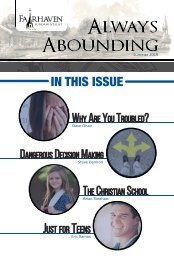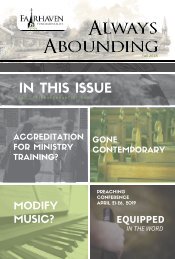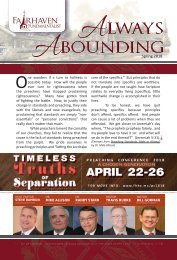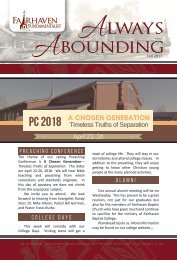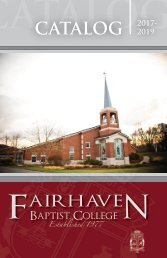You also want an ePaper? Increase the reach of your titles
YUMPU automatically turns print PDFs into web optimized ePapers that Google loves.
FUNDAMENTALIST
Always
Abounding
Spring 2020
ABC's of
Church Death
Teens
A to Z
THE SUSTAINERS’ CLUB
PROVIDES FINANCIAL
ASSISTANCE IN THE
FORM OF
SCHOLARSHIPS TO
STUDENTS.
Whether you are a
concerned individual or a
church looking for a
worthy missions project,
you can make a difference.
Would you consider giving?
Donate at the following link
or scan the code:
fhbc.me/sustainers
Now
Available!!
2 | ALWAYS ABOUNDING
THE ABC’S OF CHURCH DEATH
by Pastor Randy Love (‘87)
The following
sermon was
preached at the
60th anniversary
of Berean Baptist
Church in Ogden,
Utah.
Congratulations on
your 60th anniversary as a church. God is
faithful, and in His faithfulness, everything
can continue to His honor and glory; but so
often, what causes the death of a local church
is not the battles it faces from the outside,
but the ones that start on the inside. Over
30 years ago, Mrs. Love and I were privileged
to follow the calling of God on
our lives to go to the Jefferson
City, Missouri, area to evangelize
and establish Old Paths Baptist
Church. We knocked on doors
and told people who we were
and what we were doing, inviting
them to join us for a service. On
one occasion, a man answered
the door. I introduced myself
and invited him to our new
church. As I was extending
our church tract toward him, a smile came
across this older gentleman’s face. Then he
asked me, “Who are you mad at?” Seeing
the confused look on my face, he turned the
question around and said, “Well, then, who’s
mad at you?” Still confused by what he was
saying, he explained, “If you’re starting a
new Baptist church, either you’re mad at
somebody or somebody’s mad at you; so
you’ve had a split.” I guess this conversation
was somewhat comical, but it is sad that we
as Baptists in particular are known among
denominations for being contrary with one
another. It should not be like that.
We see reported in periodicals a great
decline in our type of churches across
the United States. Many churches have
come to the point of destruction and final
“death.” I’ve had reports from preachers,
missionaries, and even evangelists who
have visited our church recounting the large
number of churches whose doors are closing
on a yearly basis. I think of Calvary Baptist
Church of Bowling Green, Missouri. I was
saved there in 1972 as a seven-year-old boy.
At the time, it was a thriving church, reaching
people throughout the community with the
gospel. Less than five years later, the church
was non-existent, as it still is today.
Matthew 16:18 may be referred
to as the “Magna Carta” of the
church. In it the Lord Himself
said, “upon this rock I will build my
church; and the gates of hell shall
not prevail against it.” Jesus, of
course, is the rock upon which His
church is built. I say “Amen” for
Berean Baptist Church’s 60 years
of faithfulness in Ogden, Utah,
but remember that Satan always
has been and always will be the adversary
of the church. He is not powerful enough to
destroy the church. The gates of hell cannot
prevail against God’s church; but as the
adversary, he is deceitful enough to cause
the death of some of the Lord’s churches.
Let’s take a look at the ABC’s of church
decline, destruction, and death.
A – Apathy
One of the things that cause the death of
(cont., pg 4)
www.fairhavenbaptist.org | 3
many churches is an apathy, and this apathy
can exist in a variety of ways. One way is an
apathy toward sin. Suddenly what was sin
is no longer sin, or, maybe it’s sin “as long
as it’s someone else’s—I’ve got
a good excuse about this sin in
my life. It’s where I was born,
or the home I was raised in,
etc.” Eventually apathy toward
sin will result in the destruction
of a church.
Apathy toward service for
God may also bring on the
destruction of a church. God
has saved us so that we can
serve Him. I’m thankful for the
example of the apostle Paul. In Acts 9, he
was known as Saul of Tarsus, we read how
he came down the road to Damascus and
met the Lord. He was saved! When he was
first confronted, he asked, “Who art thou,
Lord?” The answer came back, “I am Jesus.”
He quickly came to know who Jesus was, and
trusted Him as his Saviour. Then in the very
next verse, Saul asks, “Lord, what wilt thou
have me to do?”
When we realize what great things the
Lord has done for us, we just want to do
something for Him. But in time, apathy tries
to enter into our life of service in one way
or another. I like Romans 12:11 where the
Bible tells us not to be slothful in business,
but to be fervent in spirit, serving the Lord.
Are you still fervent in your ministry where
you are serving the Lord? Are you still
fervent in spirit? Does it still excite you to
have that opportunity to stand before a class
of boys and girls and teach them the Word
of God? Do you remember how it was when
you were first given that opportunity? Do
you still have that love for your ministry? An
apathetic attitude towards ministries and
souls may very well bring about the decline,
destruction, and even death of a church. Our
main business is still to reach the lost with
the gospel, isn’t it? The business of reaching
the lost is still on the heart of God, and when
it’s not on our heart—when it’s not on my
heart—it will bring decline, destruction, and
potential death of the local church.
How about an
apathy, or just a simple disregard,
for the Scriptures? The resurrected
Lord appeared to two men as they
walked along the road to Emmaus.
He walked and talked with them,
and when their eyes were opened,
they knew who He was. What did
they say? “Did not our heart burn
within us, while he talked with us by
the way, and while he opened to us
the scriptures?” I’m not saying that we are
not having our time of devotions, but are
we coming away with absolutely nothing,
without our hearts being stirred? Maybe we
are just checking off a list. “Well, I did that.”
This is the A of apathy.
What about the C?
C could represent a couple areas. For
instance, it could refer to the contamination
of sin. That could certainly cause the decline,
destruction, and death of a local church.
Sin in the Bible is compared to leaven, and
a little leaven leavens the whole lump.
Sin in the camp affects the entire camp or
congregation.
C could also stand for compromise. The
sin of compromise brings about the decline,
destruction, and death of a church. Some
churches today are selling out to false
doctrine, while others to fleshly desires,
which both bring destruction.
Now some of you, if you were paying
attention, said, “Wait a second! He skipped
over the B.” I did indeed leave it out—
intentionally. Follow along with me. Proverbs
6:16-19 says, “These six things doth the
LORD hate: yea, seven are an abomination
4 | ALWAYS ABOUNDING
unto him: a proud look, a lying tongue,
and hands that shed innocent blood, an
heart that deviseth wicked imaginations,
feet that be swift in running to mischief, a
false witness that speaketh lies, and he that
soweth discord among brethren.”
What about the B?
The B is the “busybody brother.” I don’t
know of anything in our type of churches
that has done more harm to the cause of
Christ than fellow believers sowing discord
among themselves. As I stand before you
tonight and deliver this message to you,
I’m going to tell you that in over 45 years of
being a member of an independent Baptist
church, I don’t recall hearing one sermon
on the abomination of sowing discord. I
have heard prophetic sermons about
the abomination of desolation. Why not
sermons on the abomination of discord? In
Proverbs 6, seven things are listed that are
abominations to God.
What is an abomination? It is something
disgusting, and in particular, morally
disgusting. We independent, fundamental
Baptists know very well some
abominations in the Bible that
are morally disgusting. We shout
out about “alternative lifestyles.”
We’ll go down to the state house
about that. I’m certainly not
saying that we shouldn’t do that,
but there’s 16 different times in
the book of Proverbs alone where
abominations are mentioned. We
can go from there to other books
of the Bible as well. Let’s take a quick look
at the list of abominations provided for us
in Proverbs 6, beginning with a proud look.
Pride is something that God hates and is an
abomination to Him. And why would it not
be? Isn’t Lucifer himself the chief and prime
example of someone who was prideful?
The proud look is something that God
hates. God also hates a lying tongue—it’s
an abomination to Him. Again, why would
He not hate it? From the beginning the devil
abode not in truth because there is no truth
in him. Murderous hands that shed innocent
blood are also abominable to God. He hates
that. Again, I say this is a characteristic of
the devil. “Thou shalt not kill.” Shedding
innocent blood is an abomination before
God. Can I say that, unfortunately, the most
common example that we have of that is
abortion. What happened to the outcry
concerning millions of unborn children
being slaughtered each and every year in
a country that still prints on its money “In
God We Trust”? God hates it, and it is still
an abomination to Him. God also hates an
heart that deviseth wicked imaginations.
How could someone tell whether or not they
have a wicked heart? First, a person could
examine his words. It will show up by what
is coming out of his mouth. It will also show
up in a person’s actions. Proverbs 4:23 says
to “keep thy heart with all diligence.” Why?
Because out of it come the issues of life, the
outgoings of life, the goings forth of life—all
that I do. Another abomination
is feet that be swift in running
to mischief. There was a man
in the Bible named Joseph
that had swift feet, but his feet
were quick in running from
evil, not to it! Why is it that
some cannot seem to wait to
get out of a good church? God
hates feet that are swift in
running to mischief. Included
among the list of things God hates is a false
witness that speaketh lies. And then, God
hates the abomination of he that soweth
discord among brethren. We are supposed
to love one another, and that’s more than
lip service. I have heard that God doesn’t
hate the sinner; He only hates the sin. But
(cont., pg 6)
www.fairhavenbaptist.org | 5
I have found verses in the Bible that speak
contrary to that. Now I know that God is a
God of love, and we love Him because He
first loved us. But God is also a just God, and
He’s a righteous God. He’s a holy God, and
He hates the one who decided to stand in
pride and oppose what He has stated in His
commandments. This type of individual—a
sower of discord among brethren—is literally
standing against and fighting against God’s
church. Do we think God is pleased with
that? Or that He will overlook that? Why
would a person do this? Well, because he is
wicked. He has a froward mouth—a twisted,
perverted tongue. And where did that come
from? We go back to the idea of the heart.
We saw earlier that he has a froward mouth
because he has a froward heart. He has a
wicked heart. Something is wrong with his
heart. Most, if not all discord sowing is done
with the mouth. I guess it could be done with
technology in our day and age. It could be
done with a text or an email or an Instagram
post, etc. It’s done through communication.
Proverbs describes this person as a
talebearer, revealing secrets. Just because
you know something about somebody does
not mean you have to tell other people. The
Bible tells us not to meddle with those that
are talebearers. We find ourselves guilty of
this sometimes—receiving the tales brought
to us by talebearers. There is a reason they
are telling you—and it’s because you are
listening. And if you are listening, then you
are meddling with them and going against
what this verse is warning about. I am not
to undertake or support them in this activity.
If I’m lending a listening ear to that, then
I’m supporting them. The talebearer is the
sower of discord, the sower of strife, the
revealer of secrets, the traitor in scandal.
More often than not, the talebearer seeks to
defame others for his own personal gain. “In
one way or another,” he thinks, “I am going
to put them down so I can look better, since I
don’t do what they do.” This man is a sower
of discord. The Bible clearly commands,
“Speak not evil one of another, brethren.”
God certainly loves and enjoys unity among
believers, doesn’t He? I love Psalm 133:1,
“Behold, how good and how pleasant it is for
brethren to dwell together in unity!”
Who is it that sows discord among the
brethren? I’ll let the Bible answer that for
us. Proverbs 11:9 says that it is the hypocrite
who destroys his neighbor with his mouth.
Look again at our text, “These six things
doth the LORD hate: yea, seven are an
abomination unto him: a proud look, a lying
tongue, and hands that shed innocent blood,
an heart that deviseth wicked imaginations,
feet that be swift in running to mischief, a
false witness that speaketh lies, and he that
soweth discord among brethren.”
That man that sows discord among
the brethren is an abomination to God—
disgusting and abhorrent. Why? Because
he is doing the activity of Satan. Revelation
12:10 tells us that Satan is the accuser of the
brethren. There you go. It pains me when I
hear a brother talk about another brother.
If it grieves my heart, what must it do to
the heart of God? We’re all in this together,
right? We should love the brethren.
60 more years for Berean Baptist Church
if the Lord tarries, but I want to say this to
your church and to my church—I’m not
worried about the devil destroying our
church from the outside. I think many times
that just strengthens us. I’m worried about
what the devil can do on the inside—that
leaven, that cancer of discord, strife, and
contention. I’m thankful for this church, and
trust it will continue on in the blessing of
God.
(Randy Love [‘87] is the pastor of Anchor Baptist
Church in Salt Lake City, Utah.)
6 | ALWAYS ABOUNDING
PREACHING
Conference 2020
April 19-23
INTEGRITY
The JUST man walketh in
his INTEGRITY...
Proverbs 20:7
Speakers:
Jason Brenenstuhl
Randy Starr
Jason Atwood
Fred Weiss
Sam Knickerbocker
Steve Damron
For more info & to register go to
WWW.FHBC.ME/PC2020
College Days 2020
FOR MORE INFO & TO REGISTER GO TO
W W W . F H B C . M E / C O L L E G E D A Y S 2 0 2 0
F A I R H A V E N B A P T I S T C O L L E G E
www.fairhavenbaptist.org | 7
TEENS A TO Z
by Dr. Steve Damron
We have taken as
a theme for the
2020 year, “Let
the word of Christ
dwell in you richly”
from Colossians
3:16. I preached an
opening message to
our church on this
passage. It was interesting to note that
the word “dwell” in the text has the idea of
taking residence. This is what the Word of
God should do in the life of a believer. The
Bible should not be a guest or something
that feels awkwardly out of place; instead,
the Word of God should be able to come in
and take residence in the home and life of
a believer. The following few paragraphs
are from a book that I recently finished
entitled Teens A to Z. This section is the
letter B which stood for “Make the Bible
Preeminent.”
As we begin looking at the importance
of the Word of God in our homes, let’s
first consider some familiar typologies for
the Word of God. The Bible is compared
to a sword in Ephesians 6:17, “And take
the helmet of salvation, and the sword
of the Spirit, which is the word of God.”
The Word of God is a weapon that has
been given to us to defend our homes. As
fathers, we are not left helpless in guiding
our young people as they face this wicked
ever-changing world. We can equip and
train them in the right use of the Sword of
the Lord.
The Bible is also compared to a
twoedged sword and a probing instrument
in Hebrews 4:12, “For the word of God
is quick, and powerful, and sharper than
any twoedged sword, piercing even to the
dividing asunder of soul and spirit, and of
the joints and marrow, and is a discerner
of the thoughts and intents of the heart.”
Most are familiar with this verse. The
Bible is a living and powerful book which
is such an encouragement to those rearing
children. The Word of God is alive, and it
is relevant to any time or season of our
lives. It is sharper than any twoedged
sword, indicating it can penetrate the
heart more than the body. How far will the
Bible probe? All the way to the soul and
spirit and to the joints and marrow, which
means the inmost recesses of the mind.
The Bible is also mentioned as a
crushing hammer in Jeremiah 23:29, “Is
not my word like as a fire? saith the LORD;
and like a hammer that breaketh the rock
in pieces?”
A woman had often been urged by
Christians to receive the Lord. In spite
of their persistent efforts, she continued
to harden her heart. One day she threw
a Bible and several tracts someone had
given her into the blazing fireplace. One
of the leaflets fell out of the flames, so she
cast it in again. A second time it slipped
down, and once more she put it back in.
Again her evil intentions were frustrated.
The third time, however, part of it became
scorched. That night, when the fire had
died down, she picked up the portion that
remained and exclaimed, “Surely the devil
must be in that paper for it will not burn!”
Out of curiosity she began to read the
partially destroyed tract. Because it was
a message on salvation, it brought deep
conviction to her heart. Finally, through
8 | ALWAYS ABOUNDING
that half-charred leaflet, she was led to
Christ!
The Word of God can mold and make
a young, immature boy into a strong, bold,
reliable man. It reminds me of a blacksmith
that would take a useless piece of metal
or iron and mold it into something useful.
This is the power of the Word of God. Our
homes should be saturated with it, and we
must strive to implement the Bible into
every area of our homes and lives.
Referring to Titus 1:9, “Holding fast the
faithful word as he hath been taught, that
he may be able by sound doctrine both to
exhort and to convince the gainsayers,” let
me give an illustration from a pastor from
years gone by:
The other day I received communication
from a lawyer who said that a very large
property owner had discovered that a very
small piece of property belonged to him
and not to the small proprietor in whose
possession it had remained for a very long
time. The matter seemed a trifling one.
We had a conference, and there came the
steward with the lawyers. He was furnished
with maps, and, putting on his spectacles,
examined them with great care. Why? It
was a small matter to him, but because
he was a steward he was expected to be
faithful. And when he found that this small
piece of ground belonged to his lord, he
was determined to have it. So let me say,
as stewards of the gospel of God, we must
never give up one verse, one doctrine, or
one word of the truth of God. Let us be
faithful to that which has been committed
to us; it is not ours to alter. We have but to
declare that which we have received.
Titus 1 lists the qualifications of a
pastor. One of those qualifications is to
be faithful to the Word of God. You will
notice in this text that he is taught the
Word. The application is very good for
parents of young people. As we grow in
our knowledge of the Word of God, then
we can implement it into the lives of our
own children. Here are three important
areas that we should implement the Word
of God in our lives.
1. We should study the Word of God.
As parents and authority in the lives of
our young people, we need to be students
ourselves of the Word of God. A “do-as-
I-say and not-as-I-do” attitude will ruin a
young person in this area of the learning of
the Word of God. Our young people should
see us reading, studying, and memorizing
the Word of God.
Consider this verse in Romans 15:4,
“For whatsoever things were written
aforetime were written for our learning,
that we through patience and comfort of
the scriptures might have hope.”
Notice that the Scriptures are given
to us for learning. What have you learned
from the Word of God over the past few
weeks? Remember that I Timothy 3:16
tells us all Scripture is profitable and is for
our instruction.
What are some of your favorite
passages? Have you learned from the
Word of God? According to the text, we
can learn so that we can have hope. This
world does not offer much hope; but
praise the Lord, I can go to His Word and
find hope for today.
2. We should “soak up” the Word of God.
What exactly does this mean in the life
of a young person? As a parent, I should
be listening, reading, memorizing, and
assimilating the Word of God. In other
words, my whole life should be permeated
with the Word of God. When someone is
in love with sports, it is easy to tell; and it
is easy to tell when someone is in love with
(cont., pg 10)
www.fairhavenbaptist.org | 9
politics. In the same manner, it should be
easy for our young people to see that we
are in love with the Word of God because
wherever we are, the Word of God will be
evident there.
3. We should share the Word of God.
How often do you share Christ with
others? This is a critical part of our life
being saturated with the Word of God.
When our life is filled up with God, our
conversations with others will be about
God. We will be looking for the lost and
asking the Holy Spirit to lead us into
conversations with them. We will be
sharing Christ with our young people, and
we will always be looking for opportunities
to share Biblical principles for them to live
by.
How are you undertaking the task
of implementing the Word of God into
your life? God desires us to be faithful in
heeding and keeping His Word. Make sure
that you are setting aside daily times to
personally read and study the Bible. Then,
take that knowledge and give it to your
children. As we started out the article, we
discussed what the Word of God is to us.
It is a sword, a twoedged sword, a probing
instrument, and a hammer. We have been
given some mighty tools to help us in our
child-rearing. Don’t let your tools and
weapons lay unused and gather rust. Take
full advantage of the Word of God.
(Steve Damron is the pastor of Fairhaven Baptist
Church and president of Fairhaven Baptist College.)
teens
a to z
ON SALE NOW!
EMPOWERED YOUTH
2020
NOVEMBER 9-12
10 | ALWAYS ABOUNDING
www.fairhavenbaptist.org | 11
LADIES’ BIBLE STUDY
DRESS
Recently, I had the
opportunity to speak
at a ladies’ retreat.
The theme was
having a “Melody in
Your Heart.” The Lord
kept impressing upon my heart to speak on
Christian modesty. I couldn’t understand
why. But the more I thought about it,
different examples of ladies came to my
mind who are unhappy, having no “melody
in their hearts,” because they want to be
accepted by the world but don’t fit in.
They don’t fit in at church either because
of their attraction to the world.
After the lesson, I had several pastors’
wives tell me they were so thankful that I
taught on the subject because they have
been afraid to speak on it themselves.
Many told me that they hadn’t heard the
subject spoken on in a very long time.
I believe there is a fear to speak on
this subject. Some fear comes from the
reaction they saw when pastors preached
on the subject without tact or concern
for the women they were preaching to.
There could also be a fear that they will
have women quit the church because of
teaching about this matter.
May I encourage pastors’ wives to
teach on the subject? Ladies thanked me
for teaching them—not yelling at them or
belittling them—but lovingly taking God’s
Word and teaching them. I believe you will
have the same reaction from many ladies
in your church as well.
Here are some lessons that could be
taught to your ladies. Each lesson can be
between 20 to 45 minutes (or expanded if
by Mrs. Becky Damron (‘95)
using the resources). I hope they are a help
to you.
LESSON ONE: Why does modesty need to
be taught? Why should a Christian lady
dress modestly and femininely?
Only one point here: The Bible
commands it. (I Timothy 2:8-10; Titus 2:4-
5; Deuteronomy 22:5; Romans 12:1; II
Corinthians 6:17; I Corinthians 10:31)
LESSON TWO: What are some definitions of
key words in some of the previous verses?
1. Modest (“modest apparel”): decent,
pure, not displaying one’s body, and
behaving according to a standard of what is
proper
2. Chaste: pure in thought and act, not
having any sexual intentions in nature or
appearance
3. Discreet: careful and circumspect in
one’s speech, actions, and appearance,
especially to avoid offense
4. Shamefacedness: extremely modest,
bashful, shy
5. Sobriety: seriousness, solemnity, gravity,
sedateness of manner or appearance
6. Doubting (“without doubting”): fear,
to be afraid of, to feel uncertain about (If
you’re dressing a certain way because you
are afraid of looking different.)
7. Wrath (“without wrath”): violent anger,
anger mixed with disgust (What a lot of
modern clothing portrays!)
8. Broided: braided (We may have long
beautiful hair that is braided to perfection,
but that is not our source of beauty, just as
gold and pearls aren’t either.)
LESSON THREE: What are the inner fleshly
forces that drive women and men?
12 | ALWAYS ABOUNDING
1. Men are driven by sight. (Matthew
5:27-28; I Corinthians 6:14; II Timothy
2:22; I John 2:16; Galatians 5:16)
2. Women are driven by pride (when
their body makes a man want to take a
second look). (Mark 7:21-22; Colossians
3:5; Galatians 5:19-21; Ephesians 4:19-20;
I Peter 4:3-5)
3. Who’s to blame when a man lusts after
an immodest woman? Both are at fault,
but is there something we as woman can
do to help prevent the problem? True,
there are times when a man can lust, and
the woman isn’t dressed immodestly.
However, why not do what we can as
women to prevent it?
LESSON FOUR: History
1. Historically, when Christianity came
to a pagan culture, those who were
converted became clothed. (examples: the
maniac of Gadara, the Hawaiian Islands,
Auca Indians, PNG)
2. American culture was first a “Christian”
culture (not that all were Christians). As
we have moved away from that culture,
having less and less clothing is acceptable.
LESSON FIVE: Judging
1. Is it wrong to judge a person based
on their clothing? (Showing people in
different uniforms and asking what they
assume they are is a good illustration.)
2. The writer of Proverbs judged solely on
someone’s clothing. Proverbs 7:6-10
LESSON SIX: Identity
1. People scoffed at this idea when pants
for women were first introduced. However,
today, keeping a clear distinction between
the sexes is no laughing matter. Gender
confusion is a real issue. Why not make it
abundantly clear?
2. God made a clear distinction
between male and female—in their roles,
responsibilities, and appearance.
LESSON SEVEN: Questions to ask yourself
about your clothing
1. Is it modest?
2. Is it feminine?
3. Must I use arguments from the world
to justify it?
4. Will it cause others to stumble?
5. Is it worn by the opposite sex?
6. What does it make others think of me,
or what picture am I portraying?
Ladies, may I implore you to teach
on this subject? When as a teen I was a
taught the Biblical principle of separation
from the world regarding dress, the issue
was more of identity. Christian women
who wore pants didn’t wear tight pants
or shorts. Their excuse to wear them was
that they were more “modest” because
the pants they wore were loose-fitting and
to their ankles. Now, we see no regard for
modesty. Leggings, yoga pants, and short
shorts are worn with pride by women
who claim Christian liberty. Has the world
moved closer to Bible principles? We know
that answer. I truly hope you will take time
to study the subject and teach your ladies
what God’s Word has for them about their
appearance.
(Becky Damron has been married to Pastor Steve
Damron for 25 years and serves the Lord faithfully
alongside him.)
Resources:
Dress, a Reflection of the Heart by Shirley Starr
Christian Dress and Appearance by Thomas R.
Smith
Christian Modesty and the Public Undressing of
America by Jeff Pollard
The Witness of Your Wardrobe by John and
Donna Bishop
The Rise and Fall of Christian Standards by
David Kidd
Dressing for the Lord by David Cloud
Preaching Standards: Right or Wrong? by Mike
Allison
The Naked Truth: Revealing Things We Hide
Behind by Tony Robinson
What in the World Should I Wear? by Cathy
Corle
www.fairhavenbaptist.org | 13
SUPPORTING GOD’S WORKERS
by Dave Olson
Most preachers
don’t enter
the ministry
hoping to earn a
lot of money. They
expect to sacrifice.
Unfortunately, a
pastor and his church
can suffer if he is not
compensated properly. Consider how this
can happen. Since many pastors opt out
of paying into Social Security, they will
have no way to support themselves during
their golden years unless they make wise
investments. However, if their income
is minimal, they have little to nothing
to invest. To make matters worse, many
pastors do not own their own homes
because their churches, in an effort to
cut expenses, provide parsonages. When
a pastor gets up in age and needs to step
down from his position, he can’t because he
has nowhere to live and no income. Such
a scenario happens far too often, and it
hurts both the man of God and the church.
Hopefully, you can see the need to support
God’s men financially. If you disagree with
a pastor receiving a reasonable salary from
the church, read on.
“Did you see the nice car that pastor
was driving? I wonder where he got the
money for that!” muttered a disgruntled
church member. It is surprising how many
people expect their pastor to live on a
level far below the average member. It is
almost an unspoken rule that the preacher
should reside in a stuffy old parsonage,
drive a car at least ten years old, and wear
dated clothing. Because such insensitive
members expect their pastor to live “by
faith,” they neglect to give him a raise
year after year. Meanwhile, those very
members think that they are underpaid
and deserve a raise at work.
The fact is that people in every
honorable profession deserve to be
paid, and that includes the pastor.
While some churchgoers think that pastors
do not have a “real” job, they are gravely
mistaken. The notion that a preacher
only works on Sundays and has little to do
throughout the week is nonsense. When
you read the book of Acts, we see God’s
men saying, “…we will give ourselves
continually to prayer, and to the ministry
of the word” (Acts 6:4).
One of the most taxing professions
is being a pastor because he has to
deal with the problems of so many
people, including yours! Every 45-minute
sermon you hear on Sunday morning
is forged by several hours of study and
prayer. If you attend Sunday school, return
for the evening service, and get to the midweek
service, you realize that the preacher
invests dozens of hours preparing for those
lessons too. Perhaps you never understood
that the happy young married couple who
sits on the third row is only happy because
the pastor has spent countless hours with
them in counselling. The five sick people
on the prayer list that you forgot to pray
for this week were visited by your pastor
in the hospital, at the nursing home, or
in their homes. The funeral of the head
usher that you did not have time to attend
took hours of planning by your pastor, not
to mention the time he spent helping the
struggling widow through her grief. The
pastor’s wife and children wish they had
more of his time, but they realize that
other people need him, too. Then, on the
way home from church after hearing a
sermon about tithing, you say to your wife,
14 | ALWAYS ABOUNDING
“He’s just preaching on money so he can
get his hands on it.”
Hopefully, you are not like the
person described in the previous
paragraph! Not only is a pastor
on call 24 hours a day, but he carries the
burdens of each member. What we all
must realize is that dealing with the hearts
and lives of people is more complex and
sobering than what most individuals face
at work. A pastor does not leave his work
at the office—he brings it home with him.
Never complain that a pastor gets paid
with part of the church offerings because
that is how God designed it—“Even so hath
the Lord ordained that they which preach
the gospel should live of the gospel” (1
Corinthians 9:14). Every preacher should
be paid for his work with funds raised from
God’s people.
How much should a pastor be paid?
We are not told, but Paul instructed
Timothy, “Let the elders that rule
well be counted worthy of double honour,
especially they who labour in the word
and doctrine. For the scripture saith, Thou
shalt not muzzle the ox that treadeth out
the corn. And, The labourer is worthy of
his reward” (1 Timothy 5:17-18). The man
of God is worthy of double honor. The
word worthy means “to be entitled to
something,” and honor refers to value or
money paid. Rather than being despised
or belittled for being a pastor, every man of
God should be rewarded, “especially they
who labour in the word and doctrine.” If
you thought that “double honour” merely
referred to respect, you were mistaken.
Later in the passage, we see that “worthy
of his reward” is synonymous with “worthy
of double honour.” Since God commands
churches to reward their preachers well,
they should make sure they do it.
I
heard of a church that wanted to find
a way to give double honor to their
pastor. So, the deacons got together
and figured out the average of their
salaries and doubled it, and that doubled
amount became the pastor’s new salary.
Perhaps that was extravagant, but at least
they managed to show their pastor that
they cared. Obviously, that would lead to
problems if a pastor began stacking the
deacon board with the richest men in the
church! Although the Bible does not say
how much to pay a pastor, it does imply that
he should be rewarded well for his labor.
A pastor should not be “greedy of filthy
lucre,” but he should not be condemned
for receiving a good salary. If you have a
good pastor, count it a privilege that part
of your tithes and offerings support him
financially. Having a poor pastor is not a
badge of honor. On the contrary, it is a
shameful testimony if a church lets their
pastor needlessly struggle.
(Dave Olson is the Director of Missions for Fairhaven
Baptist College.)
Alumni Breakfast
©Published by Fairhaven Baptist Church. For correspondence or changes in subscription
information, write: Fairhaven Baptist Church, Always Abounding - The Fairhaven Fundamentalist,
86 East Oak Hill Road, Chesterton, IN 46304, U.S.A. For more information, call (800) SEE-FHBC.
dr. david sorenson
module course
www.fairhavenbaptist.org | 15
86 East Oak Hill Road
Chesterton, Indiana 46304
GOD IS LOOKING FOR
BROKEN MEN WHO HAVE
JUDGED THEMSELVES IN THE
LIGHT OF THE CROSS OF
CHRIST. WHEN HE WANTS
ANYTHING DONE, HE TAKES
UP MEN WHO HAVE COME TO
THE END OF THEMSELVES,
WHOSE CONFIDENCE IS NOT
IN THEMSELVES, BUT IN GOD.










